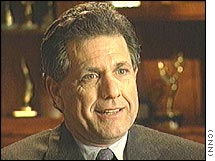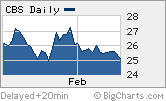|
All eyes on CBS
On Thursday, CBS will report its first results since splitting from Viacom, and Wall Street thinks the Eye Network is worth a look.
NEW YORK (CNNMoney.com) � There has been a lot of talk on Wall Street about one media megalith breakup that probably isn't going to happen. But there recently was another media split that did happen, and investors will soon get their first glimpse of just how it's working out. While it looks like Time Warner has fended off calls for a corporate schism from activist shareholder Carl Icahn, Viacom and CBS, which began trading as separate stocks last month, will report their first quarterly results as independent companies next week.
Viacom (Research), which owns the MTV and Nickelodeon cable channels and the Paramount movie studio, is viewed by many on Wall Street as the sexier of the two. But CBS (Research), which in addition to its namesake TV network owns radio and outdoor advertising units, a book publisher and theme parks, is being touted by some as being one of the best values in the downtrodden media sector. Static on the radio, but TV and billboards shine
Shares of CBS have been relatively flat since the split took place and trade at about 14 times 2006 earnings estimates, a significant discount to Viacom and other media rivals like Time Warner (Research), Walt Disney (Research) and News Corp (Research). "The stock is very cheap," said Philp Remek, an analyst with Guzman & Co. "Investors have priced in little growth. Expectations are very low." The company will report its fourth quarter 2005 results on Thursday, but most analysts and investors are more eager to hear about what CBS is predicting for 2006 than how it did in its last quarter before the split. Analysts are currently predicting revenue growth of 4 percent for 2006 and an earnings increase of 10 percent. David Joyce, an analyst with Miller Tabak + Co., said that investors may be focusing too much on the sluggish growth prospects of the radio business, which he estimates accounted for just 14.5 percent of CBS' overall revenue last year. Most traditional radio companies are now faced with pressure from satellite radio companies, which are stealing listeners, as well as a weak advertising environment. But Joyce said other parts of CBS are doing well and are not getting the credit they deserve. He points to the company's large billboard business, which he thinks should report decent revenue growth this year. Joyce argues that the beauty of the billboard business is that it is a lot less susceptible to threats from emerging technologies. That makes it still a compelling option for advertisers, "The outdoor business is healthy. You can't TiVo a billboard ad. You're forced to see it," said Joyce. John Thompson, co-manager of the Thompson Plumb Growth fund, which owns CBS, said he thinks that the radio business could turn around this year. And he adds that investors are also underestimating the strength of the company's TV business. CBS leads the ratings thanks to hits like "CSI," "Survivor," and "Without a Trace." "CBS is the number one rated network. It is doing quite well," said Thompson. "The growth of the company over the next few years might be better than many on Wall Street think." "Old" media out of favor
The potential sales of smaller CBS units could also help the company, allowing it to focus on those with the best growth prospects. To that end, CBS chief executive officer Leslie Moonves has already said that the company is shopping its Paramount Parks unit. There is also speculation that the company may sell its Simon & Schuster book division. Some sales would make sense, as other media companies have also been selling off slower growth businesses lately. Time Warner, which also owns CNNMoney.com, announced earlier this month that it was selling its book unit to French media firm Lagardere SCA. Walt Disney agreed to sell its radio division with Citadel Communications earlier this month. Along those lines, Joyce said it would not shock him if CBS eventually decided to sell its own radio business, which generates a large amount of cash and could be attractive to a private-equity buyer. Joyce points out that Moonves' expertise lies in television, not radio, after all. "Moonves grew up in the TV business. So I would not be surprised if they might look to sell radio at some point," he said. Asset sales could also be a boost to the stock, since the company conceivably could use the proceeds to boost its dividend or begin a share buyback program, Remek said. CBS already increased its quarterly dividend last month from 14 cents a share to 16 cents. At that level, CBS' dividend yields 2.5 percent, above the average dividend yield for the S&P 500. Still, Thompson concedes that it will take time for investors to recognize the value in CBS -- or in other media companies for that matter. He compares Wall Street's treatment of CBS and other media stocks now to how investors felt about retailers in the late 1990s, when Amazon.com was first making waves. "This reminds me of how everyone thought Amazon would eventually sell every book ever sold," he quips, adding that shares of book retailer Barnes and Noble (Research) have vastly outperformed Amazon (Research) since 2000. "Valuations of all old media companies are depressed because of the Google effect, the thought that everyone will abandon old media for new, and I think that's drastically overblown," said Thompson, who also owns Viacom, Disney, Time Warner, Comcast (Research), Clear Channel Communications (Research) and Dow Jones (Research) in his fund. ______________________________________________________________________ Is Icahn giving up his fight for Time Warner? Click here. For a look at why big Time Warner shareholders didn't back Icahn's breakup plan, click here. Analysts quoted in this story do not own shares of CBS and their firms have no investment banking ties with the company.
The reporter of this story owns shares of Time Warner through his company's 401(k) plan. |
| ||||||||||||||||||||||||||||||||||||||||||||||||||||||||||||||||||||||||||||||||||||||||||||||||||||||||||||||||||||||||||



